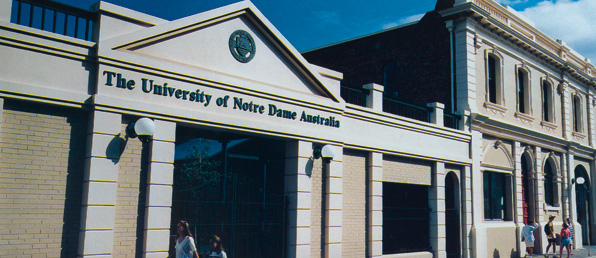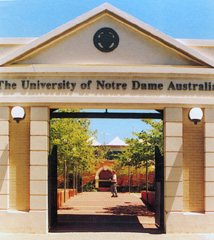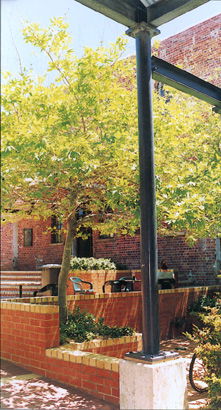The University of Notre Dame Australia
 The
University of Notre Dame Australia is
Australia's first Catholic university. It is one of only two private universities
in Australia and was established by Act of the Parliament of Western Australia
on 21 December 1989. Teaching commenced in January 1992. In 1994, the University
enrolled its first undergraduate students. Its main campus is in Fremantle
& its second campus is in Broome,
Western Australia.
The
University of Notre Dame Australia is
Australia's first Catholic university. It is one of only two private universities
in Australia and was established by Act of the Parliament of Western Australia
on 21 December 1989. Teaching commenced in January 1992. In 1994, the University
enrolled its first undergraduate students. Its main campus is in Fremantle
& its second campus is in Broome,
Western Australia.
Fremantle was established at the mouth of the Swan River in 1829.
Twenty minutes from the center of Perth, it is alive with sidewalk cafes,
galleries, restaurants and pubs. It is also one of Western Australia's
busiest ports and fishing harbors.
Perth, the capital of Western Australia, is a beautiful, clean, modern
city on the shores of the Swan River and the Indian Ocean. Four major
universities located there form a strong educational environment with Notre
Dame Australia (NDA) and are easily accessible by a 20-minute train or
bus ride from NDA.
MISSION STATEMENT
The mission of The University of Notre Dame Australia is
the advancement of learning, knowledge
and the professions, and the provision of university
education, within a context of Christian faith and
values.

THE GOALS OF NOTRE DAME AUSTRALIA
-
To provide through teaching, pastoral care and personal development,
for the total education of its students. To support an academic community
noted for excellence in teaching and research in major academic
disciplines and the learned professions.
-
To support the role and work of the Church in Australia and
other countries by helping to meet its need for special
training in areas of service (e.g. education, health, welfare, management,
theology) and by promoting research and debate on
issues relevant to the intellectual life of the Church. To make
a special contribution to the economic and social development of Australia.
-
The University seeks to be faithful to the ideals, both spiritual
and intellectual, which underlie the great Catholic
universities of the world which, for centuries, have been leaders in scholarship
and education.
 NOTRE
DAME'S LEGAL CHARTER
NOTRE
DAME'S LEGAL CHARTER
The University of Notre Dame Australia was established by
Act of the Parliament of Western Australia. The Act
was passed on 21 December 1989 and proclaimed on Australia Day, 26 January
1990. The Act provides the University with the power to award
degrees and diplomas and confers upon it full university
status. Under the terms of its Act, the University is owned, controlled
and operated by a body of Trustees and a Board of
Governors. The University's first Trustees were appointed
by Archbishop William Foley, the then Catholic Archbishop of Perth. The
Archbishop of Perth appoints or nominates a number
of the Trustees. The twelve Trustees (who are also members of the
Board of Governors) have a basic responsibility to protect and preserve
the essential Catholic character of the institution
and to ensure that it remains faithful to its mission. The duties of the
Trustees include the appointment of members of the Board
of Governors and the Vice Chancellor, and approving
the disposal of the University's assets.
The Board of Governors is the governing body of the University.
The Vice Chancellor is the chief
executive officer of Notre Dame. He is responsible to
the Board for all aspects of the day to day
management of the University. The Board meets four times
each year. The Executive Committee of
the Board meets monthly and exercises delegated authority
for the leadership of the University.
The University has a close working and collegial relationship
(but no constitutional connection) with
the University of Notre Dame in the United States. It
has drawn much of its founding inspiration and
philosophy from that outstanding Catholic university.
Five of the senior officers of Notre Dame (US)
are Trustees or Governors of the University of Notre
Dame Australia.
 ACADEMIC
PROGRAM
ACADEMIC
PROGRAM
Excellence in teaching, research and pastoral care is central
to Notre Dame. The University, through its curriculum,
its focus on quality of relationships, and its commitment to the advancement
of every student as an individual, aims to provide
a total education experience. In designing its undergraduate courses,
the University has endeavoured to ensure that all students have the opportunity
to experience an integrated core of learning which
will broaden and expose them to the Christian educational tradition
and practice. The University refers to this as its Core Curriculum.
The undergraduate Core Curriculum consists of an integrated
program of four units, drawn from the academic disciplines
of ethics, philosophy, theology and communications. This Core Curriculum
is foundational to Notre Dame's identity as a Catholic
institution and expressive of the values and philosophical
commitment which inspire the University. It is intended to provide undergraduate
students in all Colleges with an introduction to liberal
studies.
ACADEMIC YEAR
The academic year begins early in February, with first semester
lasting until late May. This is followed by a Winter
Term from June until mid August. Second semester is from August until
December. Students may enrol for credit in a range of units
in the Winter Term.
 The
University of Notre Dame Australia is
Australia's first Catholic university. It is one of only two private universities
in Australia and was established by Act of the Parliament of Western Australia
on 21 December 1989. Teaching commenced in January 1992. In 1994, the University
enrolled its first undergraduate students. Its main campus is in Fremantle
& its second campus is in Broome,
Western Australia.
The
University of Notre Dame Australia is
Australia's first Catholic university. It is one of only two private universities
in Australia and was established by Act of the Parliament of Western Australia
on 21 December 1989. Teaching commenced in January 1992. In 1994, the University
enrolled its first undergraduate students. Its main campus is in Fremantle
& its second campus is in Broome,
Western Australia.